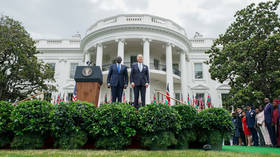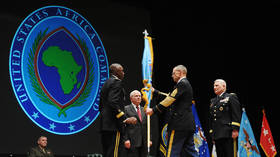The US chose this country to become its proxy in Africa. Will it be better off?

President William Ruto was elected Kenya’s head of state in August 2022 and since then he has maintained his country’s relations with the West, especially Britain and the US. He has visited these countries two and four times respectively since his inauguration, and hosted Britain’s King Charles on the monarch’s first official visit abroad after his coronation. Ruto has also visited Israel, the foremost Western ally, and has publicly expressed support for the Jewish state, a stance at odds with the African Union (AU), which has condemned West Jerusalem over the war in Gaza. In contrast, Ruto has visited China, Kenya’s largest trading partner, just once within the same period. Initially, Ruto appeared to espouse Pan-Africanism, earning praise from admirers across the continent. He had decried Africa’s humiliation by the West, condemning the international financial architecture and other neocolonial tendencies that have contributed to Africa’s poverty, instability, and underdevelopment.
In due course, however, rhetoric has prevailed over commitment. In President Ruto, the West, specifically the US, has found a dependable ally in Africa. Ruto’s state visit to the US last month, the first in 16 years by an African head of state, was significant in this regard. Symbolically, it underscored Kenya’s longstanding relations with Washington, skewed as they are. The most prominent outcome of this visit was the US designation of Kenya as a Major Non-NATO Ally (MNNA). The US bestows this status to a country which, although not part of the North Atlantic Treaty Organization (NATO) bloc, has a deep strategic relationship with the US. Kenya will thus join Egypt, Tunisia, and Morocco, the three other African countries designated as such. In “Sub-Saharan Africa” (a problematic characterization because of its divisive and racist connotations), Kenya is the first country to be accorded this status, which raises its profile in US security, intelligence, and counterterrorism operations. In the run-up to the MNNA designation, American security and intelligence personnel had frequented Nairobi.
Diplomatically, the current US ambassador to Kenya, Meg Whitman, carries the moniker “Kenya’s President” owing to her preeminence in government functions. She boldly affirmed Ruto’s victory and dismissed claims by the opposition that Kenya’s transitional elections in 2022 were rigged. Like her predecessors, she is a ubiquitous public figure and freely comments on Kenya’s internal affairs. Her views are sought by Kenya’s political elite and local media. Whitman often attends and speaks at government functions and entertains the political elite at her residence on occasions such as American public holidays. Whitman gets along with Ruto as well as with the opposition. It would be ahistorical, therefore, to regard Ruto’s proximity to the West as odd. Kenya has consistently aligned itself with the West since the Cold War, which accounts for an instinctive Western imprint on the psyche of its political elite. In a word, Ruto is not an aberration but representative of the Kenyan elite.
The MNNA designation does not oblige the US and Kenya to come to each other’s aid in the event of an attack, but allows Kenya access to US loans for the purchase of sophisticated American weaponry such as depleted uranium ammunition. From a realist standpoint, this seems beneficial to the Kenyan state because it could modernize its defense, intelligence, and security capabilities. However, for a country beset by poverty, joblessness and inequalities that manifest through poor healthcare, a wobbly education sector, food insecurity and poor infrastructure, spending on military hardware is imprudent and a misplaced priority. The MNNA designation is weighted in favor of the US. It serves its military industrial complex and at the same time sinks Kenya further into debt given that the advanced loans accrue interest. It is imperative that the Kenyan government appreciates that the outmoded state-centric approach to security needs to give way to investment in people. Security, for Kenya, a developing country, is about responsiveness, not ensnaring itself in military adventurism and grandiose security acquisitions for rent extraction given the opacity of such deals. Kenya faces no imminent attack other than internal risks related to bad governance and neglect of the poor.
Of concern is that, courtesy of the MNNA status, the US is free to place its war reserve stockpiles on Kenyan territory. Besides its military base in Kenya’s coastal town of Lamu, the US will have more access to Kenyan territory, especially in the northeastern region bordering Somalia, for military operations. It could turn Kenya into something of a US satellite state which would puncture Ruto’s Pan-Africanism ideals and further desecrate Kenya’s sovereignty. Such an unflattering status does not secure Kenya, especially when viewed through the “war on terror” lens. It is curious that in Kenya, the US has a springboard for its military escapades in Africa and the Middle East at a time when countries in the Sahel have disengaged militarily from the West and have asked Western powers, including the US, to close their military bases and exit.
It is noteworthy that this MNNA designation comes on the cusp of the imminent deployment of about 1,000 Kenyan police officers to Haiti to combat runaway gangsterism. Although Kenya’s contingent will be part of a UN mission, it is sponsored and spearheaded by the US. The deployment became certain after Kenya acceded to the US request to lead the mission. This shows that the MNNA designation has tightened Kenya’s involvement in US global security and intelligence strategy as a proxy. Specifically, it deepens US-Kenyan relations in counterterrorism in the Horn of Africa and the Gulf of Aden. Hence in the wake of the MNNA designation, Kenya joined the US in its fight against the Houthis, who are accused of attacking ships in the Red Sea in retaliation against Israeli atrocities in Gaza. Furthermore, Kenya agreed to host Houthi captives. Nairobi also pledged to continue supporting the US in its antiterrorism efforts in Somalia. As such, Kenya is a willing partner in US military adventurism, security, and intelligence operations, oblivious of the consequences. There is likely to be a backlash from militant groups targeted by the US.
Ruto’s immediate predecessors engaged China and in return received loans for infrastructure. In as much as Sino-Kenyan relations heightened in the past 20 years, it did not denote an ideological shift on Kenya’s part. At the time, Kenya’s relations with the West dimmed and hardly any mega bilateral agreements were signed. Ruto has portrayed himself as a pragmatist who is neither facing West nor East but forward looking. He seems unkeen on enhancing Sino-Kenya relations despite this seemingly pragmatic approach. Although Ruto has visited China, the foremost emerging power, the US shadow over government policy is undeniably conspicuous. Ruto has enlisted US tech companies in advancing Kenya’s digital industry and engaged the US in apparel, agriculture, climate change and infrastructure. Moreover, the World Bank and IMF have engaged him on several occasions in the wake of which retrogressive measures such disinvestment in education, agriculture, and healthcare, coupled with punitive taxes have been witnessed. These neoliberal policies have eviscerated Africa’s economies over the years and spawned poverty. Besides, Ruto openly advocates the export of Kenya’s labor force to the Middle East, Europe, and North America in exchange for remittances. How could such a policy on human resource spur Kenya’s prosperity?
Kenya’s international relations should be guided by its national interests and not the geopolitical anxieties of the US, a hegemon, or any other country. Although the concept of national interest sounds nebulous and is often interpreted from a self-serving perspective by the political elite, it substantively means that the wellbeing of citizens must be central to Kenya’s foreign policy.
The statements, views and opinions expressed in this column are solely those of the author and do not necessarily represent those of RT.














